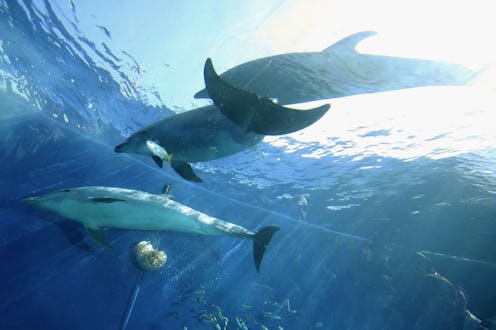Books
#TBT Reads: On the 'Island of the Blue Dolphins'
When I first picked up Island of the Blue Dolphins , I remember thinking, "Ooh! I want to live on that island on the cover!" Little did I know what I was in for. Scott O'Dell's Newbery Medal-winning 1961 book about Karana, a young Nicoleño tribe member, is at its basic level, a survival story — but hold up. It is so much more than that.
Island of the Blue Dolphins is based on the true story of a young Native American woman who was left behind on her home island and lived for nearly two decades in solitude. Considering I could barely go two hours without someone to talk to, I quickly realized that I didn't want to live on that island, but I sure loved Karana for handling it so well.
Just do yourself a favor and skip the ridiculous, white-washed movie.
Why did we love Island of the Blue Dolphins?
Like most young girls, I gravitated toward books about young women who were strong, interesting, and who seriously knew how to take care of themselves. Karana was pretty much the epitome of this. Add to that how she was based on a true story (always a major hook), and I was in love.
And in case you forgot: Karana is only left alone on this island because she flings herself off a boat to save her 6-year-old brother who was left behind. And while everyone else on the boat was like, no, it's cool, we'll go back for him later, (remember, he's 6) Karana risked everything to protect him.
So Karana is left alone on this island — one that looks like a large fish sunning itself at sea — and instead of curling up into the fetal position and crying about her poor circumstances, as would be totally understandable, she kicks some serious ass.
For 18 years, Karana fends for herself, using not just her strength, but her smarts. She builds a massive fence for protection out of whalebones. She catches sai sai fish, which she burns for light (genius). She's constantly outwitting predators, and she builds canoes like no one's business. She's amazing. I wanted to be her — and mind you, I didn't want to be in her terrible circumstances, but she may have inspired me to think I could have survived if I was. And O'Dell sure made that island sound pretty to boot.
Why do we still love it?
Let's say this again: Karana is based on a real person. A real person lived on an island all by herself from 1835 until 1853. If you thought Karana was incredible, her real life alter ego Juana Maria was truly legendary.
Juana Maria was the last surviving member of her Native American tribe, the Nicoleño. She became known as Lone Woman of San Nicolas Island after she passed away in her original homeland, the island off the coast of California.
Her story brings much needed diversity into children's literature, and dare I say, we need more books like it, today. In his book Scott O'Dell, David L. Russell said that O'Dell actually never intended the book to be kid lit.
I didn’t know what young people were reading and I didn’t consider [Island of the Blue Dolphins] a children’s book, necessarily. [It] was a protest against the hunters who came into our mountains and killed everything that crept or walked or flew. I sent the story to my agents. They sent it back to me by return mail, saying that if I was serious about the story I should change the girl to a boy, because girls were only interested in romance and such. This seemed silly to me. So I picked up the story, went to New York City, and gave it to my editor, who accepted it the next day. When it won the Newbery Medal, I was launched into writing for children and young adults.
Ha! Change the girl to a boy. Silly agents.
But it's not just that the book showcases diversity; it's that the book is actually good, and compelling. It has a lot to say about not just Nicoleño culture and the natural world, but about life as a woman in the tribe.
Life in the village should have been peaceful, but it was not. The men said that the women had taken the tasks that rightfully were theirs and now that they had become hunters the men looked down upon them. There was much trouble over this until Kimki decreed that the work would again be divided — henceforth the men would hunt and the women harvest. Since there was already ample food to last thought winter, it no longer mattered who hunted.
Karana's legacy sure showed them.
If you loved Island of the Blue Dolphins, try reading...
1. Julie of the Wolves by Jean Craighead George
Chances are, if you were a young person reading Island of the Blue Dolphins, you were also reading Julie of the Wolves , but it must be said anyway. Miyax, aka Julie, and Karana could probably be best friends and do a bunch of amazing, tough, survivalist things together, like Zac Efron and Bear Grylls.
2. Chickadee by Louise Edrich
Chickadee is quite literally Scott O'Dell-approved; it won the Scott O'Dell Award for Historical Fiction. The story follows two Ojibwe brothers who are separated, and their family journey to reunite.
3. Wave by Sonali Deraniyagala
Wave is a true account of a survival story of one seriously tough woman. But what is perhaps most interesting is the several years after the tsunami that killed her parents, her husband, and her two sons. Prep the tissue box.
Images: Giphy (2)
